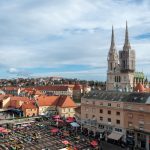One of the leaders of the tourism industry comments on the future of Croatian tourism.
Following exceptional results in 2016, the largest Croatian tourism company, Valamar Riviera, has achieved a further increase in revenues this year. In the first six months, revenues rose by 22 percent, while the number of overnight stays increased by 30 percent and the average prices by 8 percent, reports Poslovni.hr on 4 August 2017.
This shows that tourist season is getting longer, says Željko Kukurin, CEO of Valamar Riviera, who expects good results until the end of the year and does not doubt that the company will achieve a double-digit growth foreseen in its strategy. In this year, Valamar invested 900 million kunas in tourism, mostly in the construction of two resorts in Rabac. In the next year, the company plans to invest around 700 million kunas.
The investment in Rabac is almost completed, but you have already announced further investments in the following period.
Rabac is a good example of how investments in tourism can improve business conditions and living in a tourist destination. In the first year of operations, there has been the repositioning of the destination towards guests who are able to pay more, consumption and occupancy rates have increased, and the tourist offer in the destination has been improved. The project in Rabac has been realized with the exceptional support of the local community, with whom we continue to cooperate in further investments and development of the destination.
Will some of the global hotel brands enter Valamar in the future?
We are currently working on a major project of redefining our brands, and it is possible there will be partnerships with internationally recognised brands, as we already did in the case of the Kinderhotel.
The issue of staff shortages has become a particular problem this year. Have you been able to form teams needed for this season? What will be your staffing strategy in the next year?
Personnel issue is the biggest challenge and the biggest opportunity in Croatian tourism in the coming period. Valamar is the largest employer in Croatian tourism, and therefore we have a great responsibility to demonstrate an adequate human resource management policy. In the high season, we employ up to 6,000 employees. This year, we opened nearly 1,000 new jobs, and we are proud that we have mostly filled all the positions. I believe this is the result of a series of measures and programmes that we have launched over the past period, such as progressive salary growth, employee reward programmes, permanent contracts, permanent seasonal workers programme, Valamar House – which is an accommodation facility for seasonal workers, etc. The labour market has recognised Valamar as a serious employer which cares about the employees.
What else can be done with regards to the staff issue on the national level? Are you ready to import staff from abroad?
Much can be done, and statements from key people who lead tourism that this is primarily an issue for employers show an absolute misunderstanding of the problem. You cannot increase fiscal burden for organised tourism and at the same time require companies to progressively increase their wages and improve working conditions. The import of personnel must be the last solution to the employment problem in Croatian tourism because the local staff is one of our greatest advantages. I believe that tourism companies as providers of tourism development and jobs should become partners with the government and jointly develop a plan of strategic development activities with a focus on investments, jobs and the impact on overall economic development. This would give an additional boost to the development of tourism and the economy, and would also reduce the outflow of personnel abroad.
Offer given by Valamar Riviera and PBZ Croatia Insurance for Helios Faros tourist company has been accepted. What is next?
Our offer has been unanimously accepted by creditors. I believe we will finish the acquisition process in the next few months. The island of Hvar has a strong development potential and a long tourist tradition, and I am confident that, with the support of the local community, we can assist in the economic development of the island.
You are ready to launch this investment with a pension fund. Is this the most desirable investment model in the Croatian tourism at the moment?
Yes, I believe this is another great opportunity for the development of Croatian tourism and at the same time a very sound investment for our pensions. Pension funds have a fundamental role to preserve the value of our pensions, and tourism is the most valuable asset we have in Croatia, so it is logical to focus on the investments in tourism. Also, pension funds need an operating company as a partner for such investments, which is exactly what Valamar can do.
What is your opinion about investment trends in Croatian tourism?
Most investments in tourism in Croatia relate to local companies’ projects to increase the quality of accommodation, while greenfield investments and foreign investments are almost non-existent. The current investment growth in Croatian tourism is influenced by global trends: the focus of tourism demand on safe destinations and low-interest rates. Croatia has the opportunity to reposition its tourism towards higher quality offer which promotes employment and the growth of the entire Croatian economy. However, the state policy towards organised tourism over the past period has not been encouraging. Our industry is currently facing the worst conditions for investing in the Mediterranean. The conditions are marked by the highest VAT rate on tourism, the unresolved issue of tourist land, new burdens arising from real estate taxes, and generally very frequent and sudden changes in the rules of the game, often contrary to the Tourism Development Strategy. All of these circumstances can further reduce competitiveness and create a sense of insecurity among investors, thus limiting the tourism sector’s potential for further investment.
How do you see further opportunities for investment in tourism?
Croatian tourism has a historic opportunity to make a serious step forward on the world map. The key challenge lies in the fact that tourism is happening without us actively managing its development. On the contrary, it is treated more and more like an industry that can be taxed in order to cover inefficiencies elsewhere in the economy. There is a growth of low-quality household accommodation, of the number of overnights by lower paying guests, and an increase in the number of visitors during the tourist season – which is exactly the opposite of the Tourism Development Strategy and is becoming very dangerous regarding sustainable development. We will this year’s reach the number of guests defined as a goal in Croatia’s tourism development strategy, but we will be significantly below the expected revenue from tourism for that number of overnight stays.
What has caused such trend?
This has happened because we have liberalised the categorization of all kinds of different cheaper accommodation facilities, while investments in higher quality facilities are far from planned. Greenfield investments were largely absent. Tourism represents the strategic backbone of the Croatian economy, and we need to do everything to increase the competitiveness and the potential of this sector for further investment. But, at this moment, tourism does not have the status it should have. We boast about having a record tourist year by a number of overnight stays, with crowded roads and tourist centres, and no one realises that economic effects of these guests are far below our wishes and expectations.
Has the profitability of the hotel sector increased in Croatia?
The profitability of the hotel industry has grown, primarily in large companies that have invested in raising the quality of their existing portfolio. This fact quite clearly shows that brownfield investments in tourism are cost effective. We are using tourism facilities from the 1980s which have been underinvested. On the other hand, investments in new tourism projects still do not bring sufficient profit, so there are not many such projects in Croatia. This is why we believe that a competitive economic framework, such as the adjustment of the VAT rate to 10%, would in the long run significantly increase investments in higher quality accommodation facilities and staff.
Is it dangerous that tourism in Croatia accounts for 20 percent of GDP?
It is often said that we are too dependent on tourism because it makes up 20% of GDP, but that is a superficial view. If you look at Europe, there are many destinations that live from tourism and where the share of tourism in GDP is over 50%. Of course, these are not states but regions or parts of a country, but the Croatian economy cannot be compared to the economies of Italy, Spain or France. Also, which other industry in Croatia is globally competitive?
How do you see the future development of Croatian tourism?
If we start actively managing Croatian tourism, for which this government has shown interest, I believe that tourism can be the driver of economic development and contribute significantly to the development of other sectors such as agriculture, construction, trade, and small and medium sized entrepreneurship.
Translated from Poslovni.hr.







